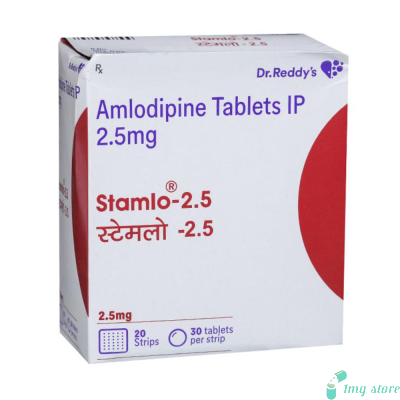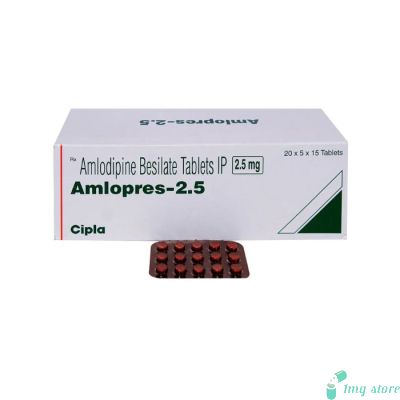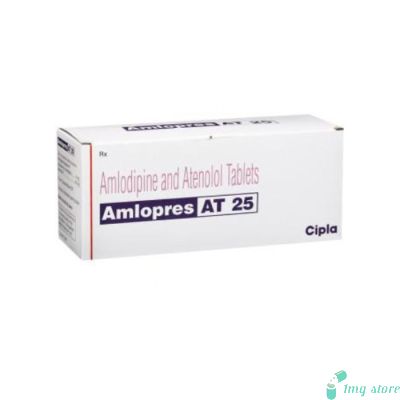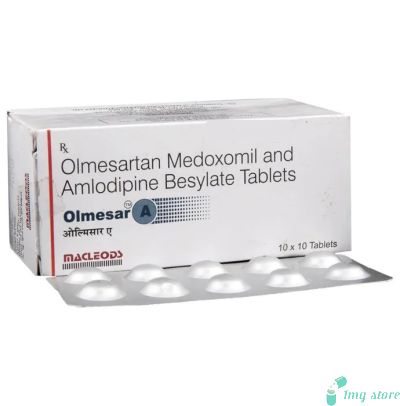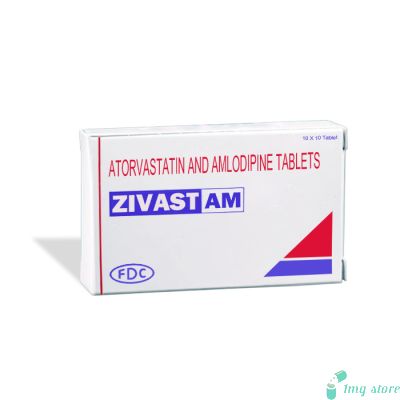Amlip Tablet (Amlodipine)
Amlodipine, marketed under the trade name Amlip/Norvasc, is a widely prescribed medication used for the management of high blood pressure (hypertension) and certain types of chest pain known as angina.
Introduction: Amlip Tablet (Amlodipine)
Amlodipine, marketed under the trade name Amlip/Norvasc, is a widely prescribed medication used for the management of High Blood pressure (hypertension) and certain types of chest pain known as angina. It belongs to the class of drugs called calcium channel blockers, which work by relaxing and widening the blood vessels, allowing for smoother blood flow and reducing the workload on the heart.
Dosage Information:
The dosage of Amlodipine can vary depending on the specific condition being treated, individual patient factors, and the prescribing physician's recommendations. It is crucial to follow the prescribed dosage and consult a healthcare professional for personalized advice. The typical recommended starting dose for most adults is usually 5 mg once daily, either with or without food. However, the dosage may be adjusted based on the patient's response to the treatment. It is important to note that Amlodipine should not be abruptly discontinued without medical consultation.
Amlodipine Alternative Medication:
While Amlodipine is a commonly prescribed medication for hypertension and angina, there are several alternative medications available that belong to the same class of drugs or have similar mechanisms of action. These alternatives may be prescribed based on individual patient factors, preferences, and the healthcare provider's judgment. Some alternative medications to Amlodipine include:
Nifedipine: Nifedipine is another calcium channel blocker that is used for the treatment of hypertension and angina. It works similarly to Amlodipine by relaxing blood vessels and improving blood flow.
Verapamil: Verapamil is a calcium channel blocker that is used for the treatment of hypertension, angina, and certain heart rhythm disorders. It helps to lower blood pressure and reduce the frequency of angina attacks.
Diltiazem: Diltiazem is a calcium channel blocker used for the treatment of hypertension, angina, and certain heart rhythm disorders. It relaxes blood vessels and improves blood flow, thereby reducing blood pressure and relieving angina symptoms.
Amlodipine Trade Name and Generic Name:
Amlodipine is marketed under various trade names, with Amlip being one of the most commonly used brands. It is important to note that Amlodipine is the generic name for the medication, which refers to the active ingredient responsible for its therapeutic effects. The trade name Amlip is specific to certain manufacturers or pharmaceutical companies that market the medication under that brand name.
Amlodipine as Blood Pressure Medication:
Amlodipine is widely recognized as an effective blood pressure medication. By blocking calcium channels, it prevents the influx of calcium into smooth muscle cells lining the blood vessels, resulting in relaxation and vasodilation. This leads to a decrease in peripheral vascular resistance, reducing blood pressure. Amlodipine's ability to control blood pressure is crucial in preventing cardiovascular complications associated with hypertension, such as heart attacks, strokes, and kidney problems.
In conclusion, Amlodipine Tablet (Amlip) is a widely prescribed medication used for the management of hypertension and angina. It belongs to the class of calcium channel blockers and works by relaxing blood vessels, thus improving blood flow and reducing blood pressure. The dosage of Amlodipine should be determined by a healthcare professional, considering individual patient factors. While Amlodipine is a commonly prescribed medication, there are alternative medications available that can be used based on specific patient needs. Amlodipine is marketed under various trade names, with Amlip being one of them, while Amlodipine is the generic name referring to the active ingredient.
Precautions To Be Taken While Using Amlip Tablet (Amlodipine)
Heart Conditions: It is important to exercise caution when using Amlodipine if you have certain heart conditions. Inform your healthcare provider if you have congestive heart failure, aortic stenosis (narrowing of the heart's aortic valve), or any other heart-related conditions. Amlodipine may affect heart function and require dosage adjustments or alternative treatment options.
Liver Function: Individuals with impaired liver function should use Amlodipine with caution. The medication is metabolized in the liver, and any existing liver conditions may affect its clearance from the body. Regular monitoring of liver function may be necessary to ensure the safe use of Amlodipine.
Pregnancy and Breastfeeding: Amlodipine/Norvasc should be used with caution during pregnancy and breastfeeding. It is important to discuss the potential risks and benefits with your healthcare provider. Amlodipine is classified as Pregnancy Category C, which means its safety in pregnancy has not been conclusively determined.
Children and Elderly: The Safety and effectiveness of Amlodipine in children and elderly patients may differ from adults. Special caution and monitoring may be required when administering Amlodipine in these age groups.
Allergies and Sensitivities: Inform your healthcare provider if you have any known allergies or sensitivities to Amlodipine or other calcium channel blockers. Amlodipine may contain inactive ingredients that can cause allergic reactions or other adverse effects.
Utilization of Amlip Tablet (Amlodipine)
Hypertension: Amlodipine is primarily prescribed for the management of high blood pressure. By dilating the blood vessels, it helps to reduce blood pressure, thus preventing complications associated with hypertension such as heart attacks, strokes, and kidney problems.
Angina: Amlodipine/Norvasc is also used in the treatment of angina, a condition characterized by chest pain or discomfort caused by inadequate blood flow to the heart muscles. By relaxing the blood vessels, it improves blood supply to the heart, relieving angina symptoms and reducing the frequency and severity of chest pain episodes.
Amlip Tablet (Amlodipine) side effects are generally mild and transient.
Common Side Effects: Amlodipine may cause common side effects, including peripheral edema (swelling of the hands and feet), headache, dizziness, flushing, fatigue, and nausea.
Cardiovascular Effects: In some cases, Amlodipine may cause hypotension (low blood pressure), palpitations, and chest pain. These symptoms should be promptly reported to a healthcare professional.
Allergic Reactions: Although rare, allergic reactions to Amlodipine/Norvasc can occur. Seek immediate medical attention if you experience symptoms such as rash, itching, swelling, severe dizziness, or difficulty breathing.
Uncommon Side Effects: Amlodipine may rarely cause more serious side effects, such as liver problems, increased heart rate, muscle pain or weakness, and mood changes. Consult your healthcare provider if you experience any of these symptoms.
Rare but Serious Side Effects: Although extremely rare, Amlodipine has been associated with serious side effects, including Stevens-Johnson syndrome (a severe skin reaction), angioedema (severe swelling of the face, lips, tongue, or throat), and hepatitis (inflammation of the liver). If you experience any unusual symptoms, seek immediate medical attention.
Help Section - Amlip Tablet (Amlodipine)
Can Amlodipine Tablet (Amlip) be taken on an empty stomach?
Answer: Amlodipine can be taken with or without food. It does not need to be taken on a full stomach. However, it is important to follow the specific instructions provided by your healthcare provider or pharmacist regarding the administration of Amlodipine.
Can Amlodipine/Norvasc be used for the treatment of heart rhythm disorders?
Answer: Amlodipine is primarily indicated for the treatment of high blood pressure (hypertension) and angina. It is not typically used as a first-line treatment for heart rhythm disorders. However, in some cases, it may be prescribed as an adjunct therapy to help control blood pressure in patients with certain heart rhythm abnormalities. It is important to consult with a cardiologist to determine the most appropriate treatment approach for heart rhythm disorders.
Can Amlodipine Tablet (Amlip) be safely used in elderly patients?
Answer: Amlodipine can be used in elderly patients; however, caution and close monitoring are recommended. Age-related changes in the body may affect the metabolism and response to medications. Elderly patients may be more susceptible to certain side effects, such as dizziness or fluid retention. Therefore, it is important for healthcare providers to consider individual patient factors and adjust the dosage if necessary.
Is it safe to stop taking Amlodipine abruptly?
Answer: It is not advisable to stop taking Amlodipine abruptly without consulting your healthcare provider. Suddenly discontinuing Amlodipine can lead to a rebound increase in blood pressure and potentially cause adverse effects. If you wish to discontinue or change your medication regimen, it is important to discuss it with your healthcare provider, who can provide guidance on how to gradually taper off the medication while monitoring your blood pressure.
Can Amlodipine cause interactions with herbal supplements?
Answer: Amlodipine has the potential to interact with certain herbal supplements. It is important to inform your healthcare provider about any herbal supplements you are taking, as some may have blood pressure-lowering effects or affect the metabolism of Amlodipine. Examples include garlic supplements, ginkgo biloba, and St. John's wort. Your healthcare provider can assess potential interactions and provide personalized advice based on your specific situation.
Drug Connection with Amlip Tablet (Amlodipine)
Other Blood Pressure Medications: Amlodipine should not be used concomitantly with other blood pressure-lowering medications without the guidance of a healthcare professional. Combining multiple blood pressure medications may lead to excessive blood pressure reduction or adverse effects.
Grapefruit Juice: Grapefruit juice and its components can interact with Amlodipine, potentially increasing its blood levels and the risk of side effects. It is advisable to avoid consuming grapefruit or grapefruit juice while taking Amlodipine.
CYP3A4 Inhibitors and Inducers: Amlodipine/Norvasc is metabolized by the enzyme CYP3A4. Therefore, drugs that inhibit or induce this enzyme may affect the metabolism and efficacy of Amlodipine. Inform your healthcare provider about any medications you are taking, including over-the-counter drugs, herbal supplements, and prescription medications, to ensure the safe and effective use of Amlodipine.
Beta-Blockers: Combination therapy with Amlodipine and beta-blockers may be beneficial in some cases; however, caution should be exercised due to the potential for additive effects on blood pressure and heart rate. Close monitoring is necessary when using these medications together.
| Manufacturer | : | Cipla Pharma, India |
| Equivalent Brand | : | Norvasc |
| Generic Search | : | Amlodipine |








